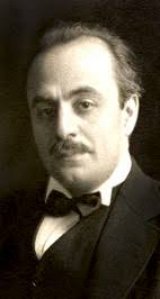On Eating and Drinking
Kahlil Gibran 1883 (Bsharri, Mount Lebanon Mutasarrifate) – 1931 ( New York City)
Then an old man, a keeper of an inn, said, Speak to us of Eating and Drinking.
And he said:
Would that you could live on the fragrance of the earth, and like an air plant be sustained by the light.
But since you must kill to eat, and rob the newly born of its mother’s milk to quench your thirst, let it then be an act of worship.
And let your board stand an altar on which the pure and the innocent of forest and plain are sacrificed for that which is purer and still more innocent in man.
When you kill a beast say to him in your heart,
“By the same power that slays you, I too am slain; and I too shall be consumed.
For the law that delivered you into my hand shall deliver me into a mightier hand.
Your blood and my blood is naught but the sap that feeds the tree of heaven.”
And when you crush an apple with your teeth, say to it in your heart,
“Your seeds shall live in my body,
And the buds of your tomorrow shall blossom in my heart,
And your fragrance shall be my breath,
And together we shall rejoice through all the seasons.”
And in the autumn, when you gather the grapes of your vineyards for the winepress, say in your heart,
“I too am a vineyard, and my fruit shall be gathered for the winepress,
And like new wine I shall be kept in eternal vessels.”
And in winter, when you draw the wine, let there be in your heart a song for each cup;
And let there be in the song a remembrance for the autumn days, and for the vineyard, and for the winepress.
Font size:
Submitted by halel on July 13, 2020
Modified on April 28, 2023
- 1:28 min read
- 120 Views
Quick analysis:
| Scheme | XXXAX BXXXBXBXC BCXAC |
|---|---|
| Characters | 1,547 |
| Words | 296 |
| Stanzas | 3 |
| Stanza Lengths | 5, 9, 5 |
Translation
Find a translation for this poem in other languages:
Select another language:
- - Select -
- 简体中文 (Chinese - Simplified)
- 繁體中文 (Chinese - Traditional)
- Español (Spanish)
- Esperanto (Esperanto)
- 日本語 (Japanese)
- Português (Portuguese)
- Deutsch (German)
- العربية (Arabic)
- Français (French)
- Русский (Russian)
- ಕನ್ನಡ (Kannada)
- 한국어 (Korean)
- עברית (Hebrew)
- Gaeilge (Irish)
- Українська (Ukrainian)
- اردو (Urdu)
- Magyar (Hungarian)
- मानक हिन्दी (Hindi)
- Indonesia (Indonesian)
- Italiano (Italian)
- தமிழ் (Tamil)
- Türkçe (Turkish)
- తెలుగు (Telugu)
- ภาษาไทย (Thai)
- Tiếng Việt (Vietnamese)
- Čeština (Czech)
- Polski (Polish)
- Bahasa Indonesia (Indonesian)
- Românește (Romanian)
- Nederlands (Dutch)
- Ελληνικά (Greek)
- Latinum (Latin)
- Svenska (Swedish)
- Dansk (Danish)
- Suomi (Finnish)
- فارسی (Persian)
- ייִדיש (Yiddish)
- հայերեն (Armenian)
- Norsk (Norwegian)
- English (English)
Citation
Use the citation below to add this poem to your bibliography:
Style:MLAChicagoAPA
"On Eating and Drinking" Poetry.com. STANDS4 LLC, 2024. Web. 19 Apr. 2024. <https://www.poetry.com/poem/54008/on-eating-and-drinking>.



Discuss the poem On Eating and Drinking with the community...
Report Comment
We're doing our best to make sure our content is useful, accurate and safe.
If by any chance you spot an inappropriate comment while navigating through our website please use this form to let us know, and we'll take care of it shortly.
Attachment
You need to be logged in to favorite.
Log In